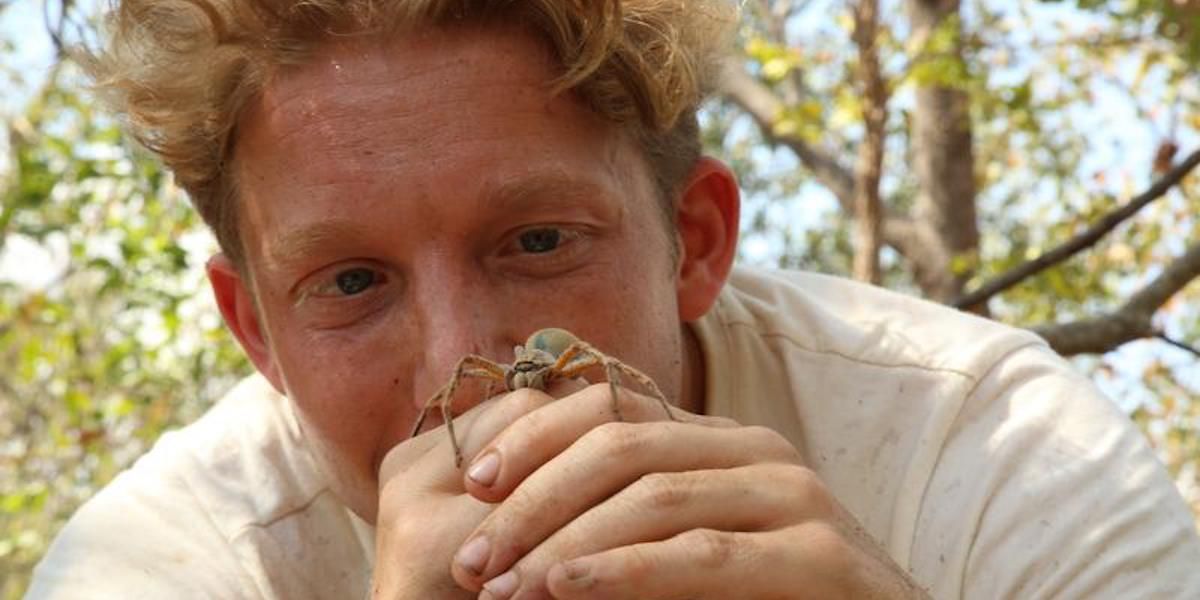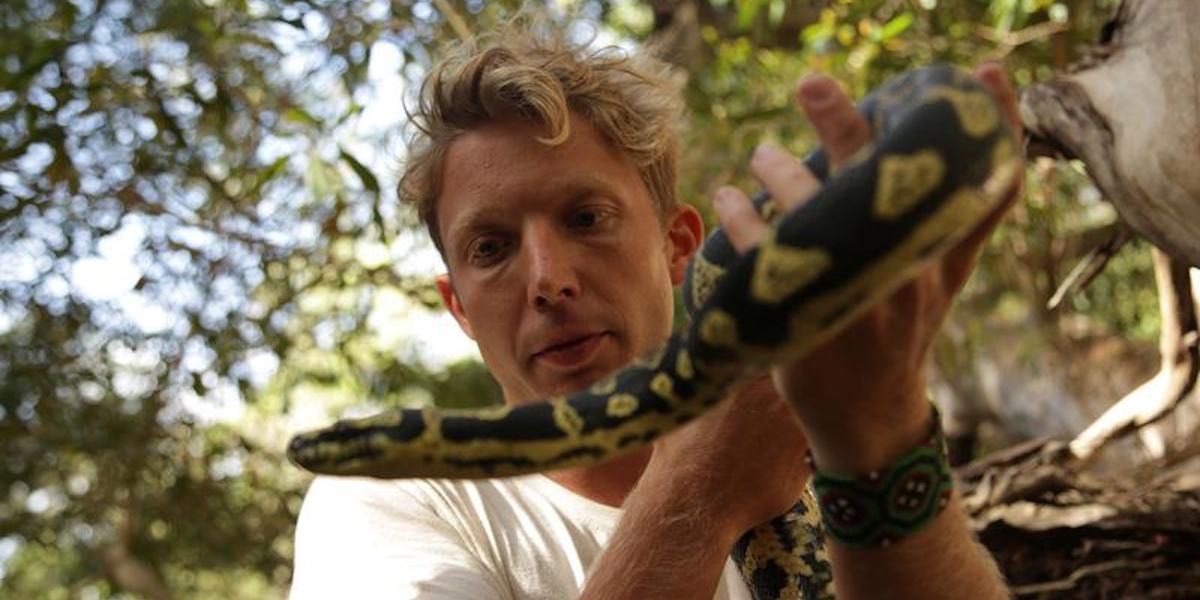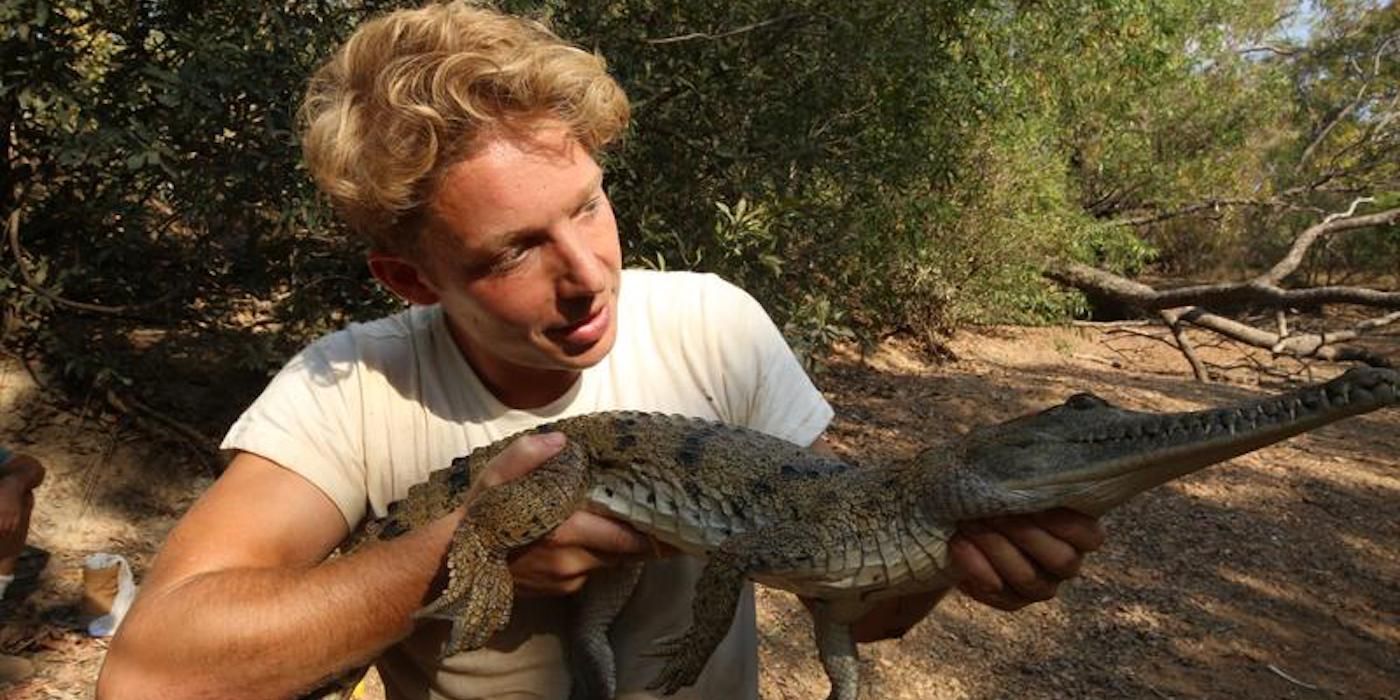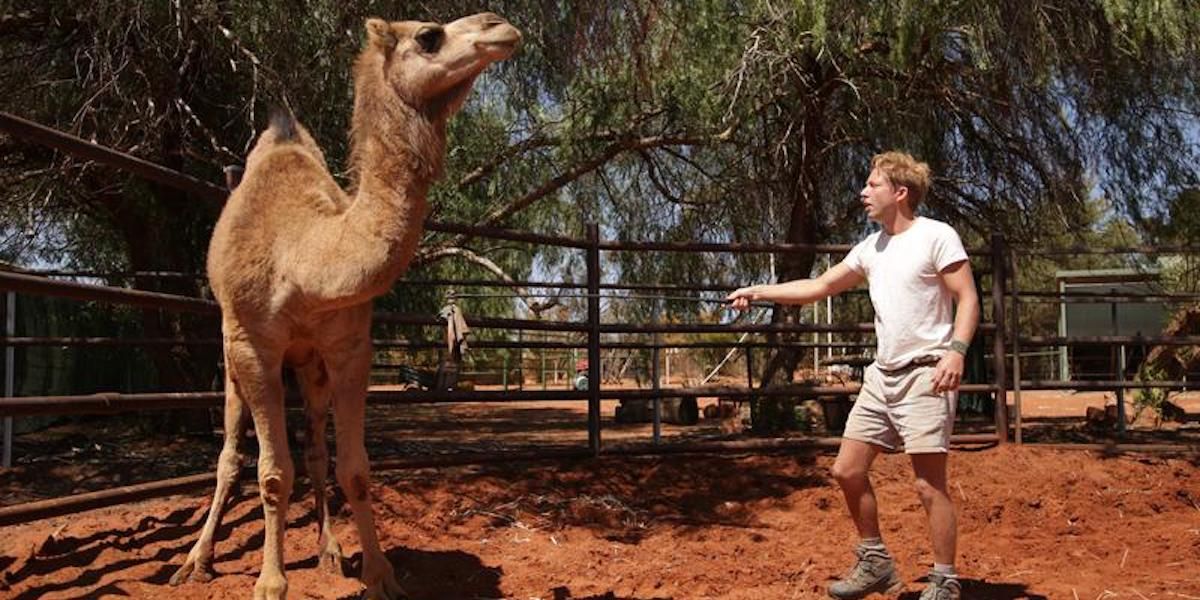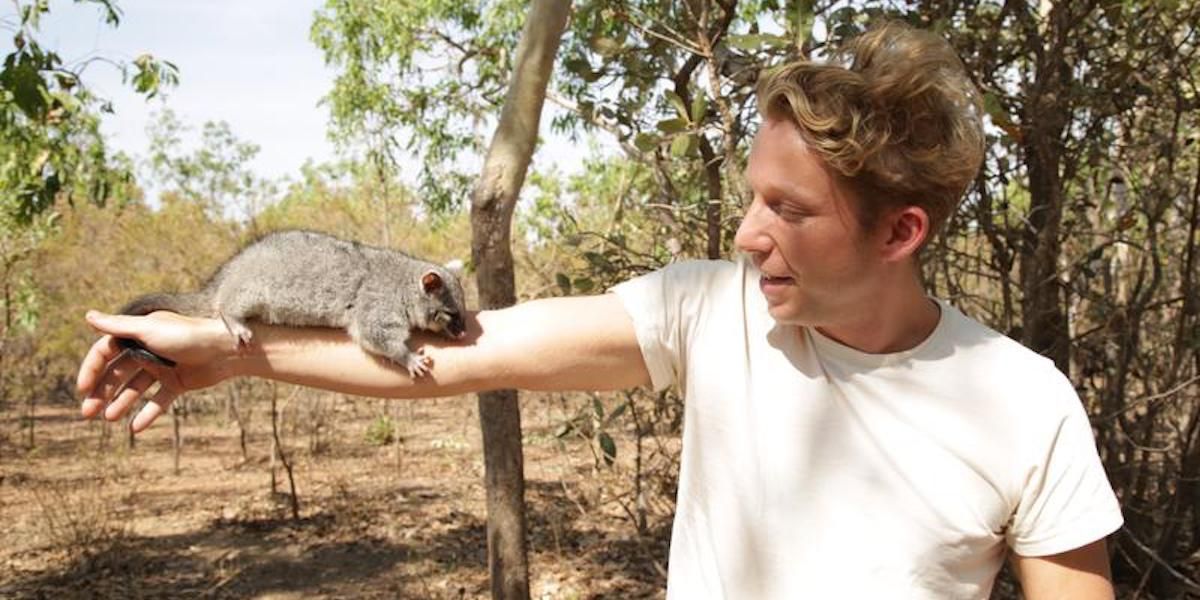When Jack Randall was thirteen years old, he was already obsessed with animals, but his life took an unexpected turn when he became an apprentice to one of the greatest wildlife conservationists of all time, The Crocodile Hunter himself, Steve Irwin. Fast-forward sixteen years, and Randall is following in his mentor's footsteps with a new wildlife docu-series of his own. After experiencing considerable success with his first show, Fearless Adventures With Jack Randall, the young zoologist is embarking on his next great television experience.
Out There With Jack Randall is a new series on Nat Geo Wild which follows Jack's adventures in the untamed wild, seeking out fascinating animals and teaching audiences the importance of protecting these creatures and their habitats. The next episode of the series, airing July 28, sees Jack studying freshwater crocodiles.
While promoting the series, Jack Randall spoke to Screen Rant about his work as an animal expert, from handling venomous snakes to learning about giant tarantulas. He explains how knowledge is the secret to overcoming fear, and discusses his love of Australia, an untamed bastion of beautiful wildlife and unadulterated scenery.
Do you remember your first-ever interaction with a dangerous animal?
It depends on what you define as "dangerous." I started handling animals when I was really young. Growing up, I was reading about them, watching documentaries, and I wound up in Australia when I was 14. Handling animals was something I learned growing up. They weren't "dangerous," but I remember getting scratched up by lizards. Big claws! I remember taking photos, and I remember thinking it was fun, but not actually dangerous. Then, handling snakes... You have to work your way up, you don't go straight to the venomous ones. I handled the most venomous snake in the world (the inland taipan) at the age of 13. (Laughs) I was always wary that this snake could bite me, that a single drop of venom was enough to kill one hundred people. But with animals, it's more about their temperament which determines whether or not they're dangerous. In captivity, they're extremely calm, and it's very unlikely that you can get bitten, except if you're feeding them, for example. But animals are dangerous depending on their behavior. Wild animals are more dangerous. They're more inclined to be defensive. I've worked with lots of venomous snakes in the wild, including the second most venomous snake in the world, a number of times. I worked with elephants in Africa. Elephants can potentially be very dangerous. But the thing with animals is, if you give them their space, they're not actually dangerous. I don't get bitten that much, and I've never been bitten by a venomous snake. When I feel like I'm out of my comfort, or I'm in a dangerous situation, I don't go into it. I tend to not end up in something that I consider to be dangerous. It takes years of being around these animals and learning about their behavior and understanding whether it's a dangerous situation or not.
What was it like to handle the most venomous snake in the world when you were only 13 years old?
When Steve Irwin gave me that snake to handle it, he didn't even give me much instruction! He said to "just stay calm."
Can you talk about your time working as an apprentice to Steve and how you first met him?
I was working in Mexico. It's home to a lot of rattlesnakes, and it was my first time being out there, and I was always looking for rattlesnakes, even when it wasn't what I was supposed to be doing. I was hanging out with a bunch of people who saw that. And there was somebody who had just recently met Steve, and they helped me meet Steve. When I first met Steve, I was 13. The first thing he tole me was, "I hear you love snakes." I said, "Yeah, I love them. I've got a pet rat snake." He asked, "Have you ever been bitten by it?" And I said, "Yes, I have been bitten by it." And then he laughed and said, "Why don't you come to Australia and work in my reptile department as an apprentice?" So I did! Under Steve's guidance, I learned how to look after and handle reptiles. It was kind of being thrown into the deep end, but with Steve, it was all about, "you can do it." He gave me that confidence and skill to handle venomous snakes. And we went out catching snakes in the wild, as well. And feeding crocodiles with Steve... All these things I never dreamed of in the U.K.!
Australia has a reputation where every animal is trying to kill you.
Yeah.
Spiders, snakes, dingos. "The dingo took my baby." Kangaroos. Today's modern world has been largely domesticated, or at least that's the perception. What is it about Australia that allows it to remain, for lack of a better word, wild?
That's a good question. Australia has a reputation, I don't know if it's good or bad – for me it's good – for having these animals, like venomous spiders. The most venomous spiders in the world live in Australia. Some of the most venomous snakes in the world. It doesn't have traditional predators, like lions in Africa. But it obviously has saltwater crocodiles, and it has long coastlines with sharks. All of these creatures... The reputation is not entirely deserved. You can go to parts of Asia and Africa and South America and find just as many deaaly animals there. But Australia does have really unique animals. It's the land of reptiles. Lots and lots of reptiles. Those reptiles have evolved to live in every single area in Australia. And it's "wild" because Australia is massive, but the population is only about 20 million people, and that population is focused mostly in coastal areas. The whole outback, that central area, has agriculture, but there are a lot of places, once you start going further, there's really no agriculture. It's so dry, but animals have managed to survive out in these outback conditions. It's a mixture of a fact that it's a big area with only a few people, and there are many areas that don't support agriculture. Australia really is one of those places where the ecosystems are made for a wild place. And it's so remote, as well. It really is quite amazing. I've been to Australia many times, I've spent years there, and I'm still exploring new places. But I've learned things are changing there. There is one animal that is the culprit in the reduction of many animal species there, called the cane toad. It was introduced into Australia to eat the cane beetles in north-east Australia, but they mated like crazy and they're spreading, and they're poisonous, so animals that eat them, die.
Even though it's "wild," it's still a delicate ecosystem that can be thrown into disarray by a new, outside species.
It's a challenge to the ecosystem of Australian, even though it is quite wild. The series covers all of these topics, while also making it exciting and interesting and educational.
I live in New York City, and the worst we get are usually rats and roaches, but I was house-sitting once, in the Lower East Side, and I walked by my window, and on the fire escape, a hawk caught a pigeon in its talons and ate it right in front of me!
Wow! That is awesome. The funny thing is, you can still see wildlife, even in the city. I've been all over the world, finding wild places. For me, it's about studying the biodiversity and exploring those areas and learning all about it.
Some people don't understand the appeal of tracking these animals, precisely because they're seen as dangerous. Apart from the love of these creatures, why, socially, do you do this?
The main reason for doing it is for learning. Education. Science. I might be showing off an animal, but we're also doing real research. In the venomous snakes episode, we're working with venom researches. In the crocodile episode, we're working with crocodile researchers to track the movements of saltwater and freshwater crocodiles. To be a zoologist, to be a biologist, you have to track the animals in the field. It's the only way to understand wildlife. You can't do it in a lab, and you can't do it with zoo animals. My mission is really to show off wild animals in wild spaces, and to promote them.
Your old show was "Fearless Adventures." With that in mind, you seem like a pretty fearless guy, but have there ever been any animals where you just go, "nope?"
(Laughs) There are certainly animals I don't understand. Before understanding them, I'm more cautious. I won't jump into a situation I don't understand. It could be dangerous, and it might be a bit scary. But it doesn't take that long to get over that. I'm thinking of an example... I used to be a little bit... Spiders are a little bit scary. I first found a lot of big tarantulas in South America. It was only from seeing them in the wild and gradually getting comfortable with them, that I realized there's nothing to really be afraid of with them. There are animals I haven't dealt with before, and they're the ones I would be more cautious around. I don't think there's any that I'm like, "Nope, no way," but there are certainly ones I'm not comfortable around, and they're the ones I don't understand that well. I'm learning, every single day. I haven't been everywhere. There are different animals all around the world!
That's such a beautiful way of looking at it. I'm thinking of how people will see a bug or something and freak out, "Kill it! Kill it!" But then someone like you would see it and go, "What is that? Let's figure out what it is and how we can help." That's so great.
I'm learning, particularly in the invertebrate world. I'd say my main specialty is still snakes, but I'm learning more about invertebrates. Particularly spiders and stick insects, like praying mantises. Some people immediately think, like you said, with the spiders, "kill it!" But actually, I really love them, now. I understand them, as you said. A female tarantula will live in her burrow for 20 years, her whole life, waiting and ambushing prey that comes along. Twenty years! That's how long they live! You begin to realize that they're not just spiders. There's real character behind that. They live lives, despite being really small. I think all animals should be considered.
On the next episode of your show we're going to be seeing, Out There With Jack Randall, we're going to be seeing freshwater crocodiles. I'm told it was a particularly personal episode for you.
Yes, it is a personal episode. It's about crocodiles. I can't speak for Steve, but I'm pretty confident in saying they were his animal. He was hugely passionate about crocodiles in a time when most people vilified them. He worked really hard to change people's minds about them, to change the perception of the people of Australia about them. They are amazing animals. He instilled a bit of that passion to me. For my fifteenth birthday, his present to me was to let me feed one of his prized crocodiles in the Australia Zoo, called Monty. I was so excited to jump into the crocodile pen and feed that croc, which was a real privilege. But before jumping in, he stopped me and looked me in the eye. He said, "Before I give you the chance to jump in and feed this crocodile, you have to promise me, for the rest of your life, you will protect crocodiles." He was really really serious. I can still remember the way he looked at me. And I said, "I promise." And he said, "Okay, cool!" and we jumped in and fed the crocs.
That's amazing.
Whenever I'm working with crocodiles, or actually all wildlife, but specifically crocodiles, I feel happy that I'm doing something for these animals. I definitely think Steve would be proud that I'm doing something to help a species he really cared for. And he cared for all animals, but crocodiles were his main thing. And crocodiles aren't my main specialty, actually. Whenever I do work with them, I hope I'm doing a positive, giving back to the crocodiles through the episode, informing people of the challenges they face. That's very important to me.
Thank you so much for your time. You really are a role model to children and adults of all ages.
Thank you. That's really kind. For me, the younger audience are exactly who I want to be inspiring. That makes me so happy. Hopefully I can do that through wildlife TV, making them more curious and inspired about the natural world.
There aren't many adults who embody pure joy and curiosity the way you do, and the way Steve did. I really believe your work is so important and influential.
Thank you so much, that's really kind of you.
Out There With Jack Randall is currently airing on Nat Geo Wild.

